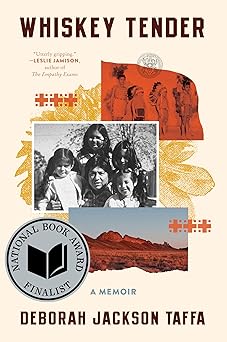
Deborah Jackson Taffa's memoir, Whiskey Tender, is a deeply personal and thought-provoking exploration of identity, assimilation, and cultural heritage. Born on the California Yuma reservation and raised in Navajo territory in New Mexico, Taffa's childhood was marked by the tensions between her Native American upbringing and the dominant American culture. Her parents, both encouraged to assimilate, wanted her to leave her cultural roots behind in pursuit of a better life, but Taffa began to question this narrative as she matured.
As she navigates the complexities of her mixed tribe identity, Taffa weaves together stories of her childhood, including her experiences on and off the reservation, with historical analysis of the assimilation policies that have ravaged Native American communities. With humor and heart, she reflects on the trauma passed down through generations and the cultural narratives of her ancestors, which have been excluded from the central mythologies of America. Taffa's account is a powerful reminder of the ongoing struggles faced by Native American communities, including the rampant criminalization of Native men, governmental policies, and the negotiation between belonging and resisting systemic oppression. Through her story, she reminds us of the sacrifices made for the promise of acceptance and the importance of honoring one's cultural heritage.
Taffa's memoir is a testament to the enduring power of family and tradition, despite the efforts to erase Native American identities. As she seeks to forge her own path, Taffa grapples with the weight of her family's past and the historical injustices that have shaped their lives. This is a deeply personal and poignant exploration of identity, community, and the ongoing struggle for cultural recognition and respect. Taffa's writing is like a gentle, yet unyielding, stream that flows through the reader, reminding us of the importance of honoring our ancestors and the stories that have been silenced for far too long.
This memoir is a powerful and deeply personal exploration of identity, assimilation, and cultural heritage. I was deeply moved by the author's story, which sheds light on the complexities of growing up in a mixed tribe identity. The writer's voice is raw, honest, and often humorous, making the reader feel like they're sitting down with this woman, sharing stories and laughter. The author's writing is like a gentle stream, flowing through the reader's mind, and reminding us of the importance of honoring our ancestors and the stories that have been silenced for far too long.
Growing up, the author's parents encouraged her to leave her cultural roots behind in pursuit of a better life, but as the author matured, she began to question this narrative. The book takes the reader on a journey through the author's childhood, exploring the tensions between her Native American upbringing and the dominant American culture. The writing is vivid, making it easy to visualize the author's experiences on and off the reservation. The author's reflection on the trauma passed down through generations is both painful and healing, forcing the reader to confront the harsh realities faced by Native American communities.
The author's account is a powerful reminder of the ongoing struggles faced by Native American communities, including the rampant criminalization of Native men, governmental policies, and the negotiation between belonging and resisting systemic oppression. Throughout the book, the author grapples with the weight of her family's past, the historical injustices that have shaped their lives, and the search for her own identity. This memoir is a testament to the enduring power of family, tradition, and cultural heritage, despite the efforts to erase Native American identities. It's a poignant exploration of identity, community, and the importance of respecting and acknowledging our cultural past.
Rating: 4.1 / 5.0
Whiskey Tender is a deeply personal and thought-provoking exploration of identity, assimilation, and cultural heritage. Born on the California Yuma reservation and raised in Navajo territory in New Mexico, the author's childhood was marked by tensions between her Native American upbringing and the dominant American culture. The author's parents encouraged assimilation, but she began to question this narrative as she matured. Her memoir is a powerful reminder of the ongoing struggles faced by Native American communities, including the criminalization of Native men, governmental policies, and the negotiation between belonging and resisting oppression. The author's writing is raw, honest, and humorous, making the reader feel like they're sitting with her, sharing stories and laughter. This memoir honors the importance of family, tradition, and cultural heritage, despite efforts to erase Native American identities. The author's story is both painful and healing, forcing the reader to confront the harsh realities faced by Native American communities.